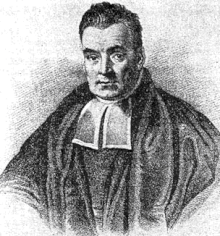Thomas Bayes
Thomas BAYES (![]() audio /beɪz/; esperantigota kiel Bajezo; ĉ. 1701 - la 7an de aprilo 1761) estis angla statistikisto, filozofo kaj presbiterkristana pastoro. Bayes estas plej konata kiel tiu kiu elpensis la teoremon nomitan laŭ li: Leĝo de Bayes, el kiu devenas ramo de statistiko, la Bajeza probablo. Fakte, ne Bayes publikigis tiun, sed ĝi estis publikigita postmorte fare de Richard Price, kiu redaktis kaj eldonis la verkadon de Bayes pri la temo [1].
audio /beɪz/; esperantigota kiel Bajezo; ĉ. 1701 - la 7an de aprilo 1761) estis angla statistikisto, filozofo kaj presbiterkristana pastoro. Bayes estas plej konata kiel tiu kiu elpensis la teoremon nomitan laŭ li: Leĝo de Bayes, el kiu devenas ramo de statistiko, la Bajeza probablo. Fakte, ne Bayes publikigis tiun, sed ĝi estis publikigita postmorte fare de Richard Price, kiu redaktis kaj eldonis la verkadon de Bayes pri la temo [1].
| Thomas Bayes | |||||
|---|---|---|---|---|---|

| |||||
| Persona informo | |||||
| Thomas Bayes | |||||
| Naskiĝo | 30-an de novembro 1701 en Londono, | ||||
| Morto | 17-an de aprilo 1761 (59-jaraĝa) en Royal Tunbridge Wells, | ||||
| Tombo | Bunhill Fields Burial Ground (en) | ||||
| Religio | Presbiterianismo vd | ||||
| Etno | Angloj vd | ||||
| Lingvoj | angla vd | ||||
| Ŝtataneco | Reĝlando de Granda Britio | ||||
| Alma mater | Universitato de Edinburgo (1719–) | ||||
| Subskribo | |||||
| Familio | |||||
| Patro | Joshua Bayes (en) | ||||
| Profesio | |||||
| Okupo | matematikisto kleriko statistikisto filozofo | ||||
| Laborkampo | Probabloteorio kaj matematiko | ||||
| Verkado | |||||
| Verkoj | An Essay towards solving a Problem in the Doctrine of Chances ❦ teoremo de Bayes vd | ||||
| |||||
| |||||
| |||||
| Filozofo | |||||
| vd | Fonto: Vikidatumoj | ||||
Vivo
redaktiThomas Bayes estis la filo de Joshua Bayes, presbiterkristana ministro. Li estis probable naskita en Hertfordshire en Sud-orienta Anglio. Lia familio estis nekonformisma familio de Sheffield. En 1719 li komencis studi logikon ĉe la Universitato de Edinburgo. Post kiam li finis siajn studojn en 1722 li revenis al Londono kaj ĝis 1734 li helpis sian patron en sia posteno kiel pastro en kapelo. En 1734 li translokiĝis al graflando Kent, kie li estis pastro ĉe Mount Zion Chapel ĝis 1752.
Bayes publikigis du verkojn: Divine Benevolence kiu traktis teologion kaj estis publikigita en 1731; kaj en la kampo de matematiko, verkaĵo eldonita en 1736 anonime - la nomo de la eldonaĵo estas "An Introduction to the Doctrine of Fluxions, and a Defense of the Mathematicians Against the Objections of the Author of The Analyst". En tiu verkaĵo li defendas Isaac Newton en respondo al la kritiko de George Berkeley.
En liaj lastaj jaroj li montris grandan intereson pri probablo.
En 1755 li malsaniĝis kaj en 1761 li mortis.
Vidu ankaŭ
redaktiReferencoj
redakti- ↑ McGrayne, Sharon Bertsch. (2011). 'The Theory That Would Not Die' el Google Books
Eksteraj ligiloj
redakti- La testamento de Thomas Bayes 1761 Arkivigite je 2011-02-03 per la retarkivo Wayback Machine
- D. R. Bellhouse, 2004, "The Reverend Thomas Bayes, FRS: A Biography to Celebrate the Tercentenary of His Birth," Statistical Science 19 (1): 3–43.
- Aŭtora profilo en la datumaro zbMATH
- Plena teksto de Divine Benevolence: Or, An Attempt to Prove that the Principal End of the Divine Providence and Government is the Happiness of His Creatures.
- Plena teksto de An Introduction to the Doctrine of Fluxions, And Defence of the Mathematicians Against the Objections of the Author of the Analyst, So Far as They are Designed to Affect Their General Methods of Reasoning

